
Blonde on Blonde is the seventh studio album by the American singer-songwriter Bob Dylan, released as a double album on June 20, 1966, by Columbia Records. Recording sessions began in New York in October 1965 with numerous backing musicians, including members of Dylan's live backing band, the Hawks. Though sessions continued until January 1966, they yielded only one track that made it onto the final album—"One of Us Must Know ". At producer Bob Johnston's suggestion, Dylan, keyboardist Al Kooper, and guitarist Robbie Robertson moved to the CBS studios in Nashville, Tennessee. These sessions, augmented by some of Nashville's top session musicians, were more fruitful, and in February and March all the remaining songs for the album were recorded.
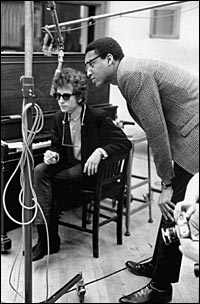
Thomas Blanchard Wilson Jr. was an American record producer best known for his work in the 1960s with Bob Dylan, the Mothers of Invention, Simon & Garfunkel, the Velvet Underground, Cecil Taylor, Sun Ra, Eddie Harris, Nico, Eric Burdon and the Animals, the Blues Project, the Clancy Brothers and Tommy Makem, and others.
"4th Time Around" is a song by American singer-songwriter Bob Dylan, which was released as the 12th track on his seventh studio album Blonde on Blonde on June 20, 1966. The song was written by Dylan and produced by Bob Johnston. Commentators often interpret it as a parody of the Beatles' 1965 song "Norwegian Wood ". John Lennon composed "Norwegian Wood" after being influenced by the introspective lyrics of Dylan. Lennon later reflected on his feelings of paranoia when Dylan first played him "4th Time Around".
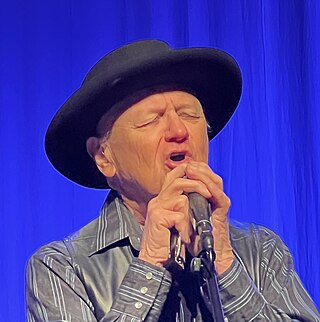
Charlie McCoy, is an American harmonica virtuoso and multi-instrumentalist in country music. He is best known for his harmonica solos on iconic recordings such as Candy Man, He Stopped Loving Her Today, I Was Country When Country Wasn't Cool, and others. He was a member of the progressive country rock bands Area Code 615 and Barefoot Jerry. After recording with Bob Dylan in New York, McCoy is credited for unknowingly influencing Dylan to decide to come to Nashville to record the critically acclaimed 1966 album "Blonde on Blonde".
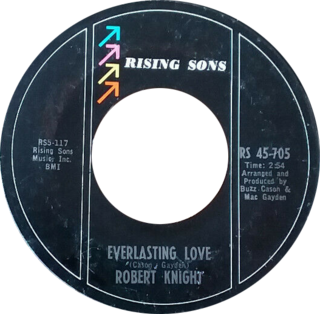
"Everlasting Love" is a song written by Buzz Cason and Mac Gayden, originally a 1967 hit for Robert Knight and since covered numerous times, most successfully by Love Affair, as well as Town Criers, Rex Smith & Rachel Sweet, Carl Carlton, Sandra Cretu, U2 and Gloria Estefan. The original version of "Everlasting Love" was recorded by Knight in Nashville, with Cason and Gayden aiming to produce it in a Motown style reminiscent of the Four Tops and the Temptations. When released as a single, the song reached No. 13 on the US chart in 1967. Subsequently, the song has reached the US top 40 three times, most successfully as performed by Carl Carlton, peaking at No. 6 in 1974, with more moderate success by the duo Rex Smith and Rachel Sweet and Gloria Estefan.
"Absolutely Sweet Marie" is a song by American singer-songwriter Bob Dylan, which was released on the third side of the double album and Dylan's seventh studio album, Blonde on Blonde (1966). The song was written by Dylan and produced by Bob Johnston. It was recorded at around 1:00 am on March 8, 1966, at Columbia Studio A, Nashville. Some commentators have interpreted the song as being about sexual frustration.
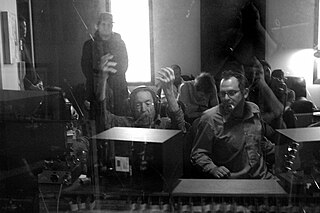
Donald William "Bob" Johnston was an American record producer, best known for his work with Bob Dylan, Johnny Cash, Leonard Cohen, and Simon & Garfunkel.

"Stuck Inside of Mobile with the Memphis Blues Again" is a song by American singer-songwriter Bob Dylan from his seventh studio album, Blonde on Blonde (1966). The song was written by Dylan and produced by Bob Johnston. It has nine verses, each featuring a distinct set of characters and circumstances. All 20 takes of "Stuck Inside of Mobile with the Memphis Blues Again" were recorded in the early hours of February 17, 1966, at Columbia Records's A Studio in Nashville, Tennessee, with the last take selected for the album. This version also appears on Dylan's second compilation album, Bob Dylan's Greatest Hits Vol. II (1971).
Aaron Kenneth Buttrey was an American drummer and arranger. According to CMT, he was "one of the most influential session musicians in Nashville history."
Robert Knight was an American singer, best known for his 1967 recording of the song "Everlasting Love".

"Just Like a Woman" is a song by American singer-songwriter Bob Dylan from his seventh studio album, Blonde on Blonde (1966). The song was written by Dylan and produced by Bob Johnston. Dylan allegedly wrote it on Thanksgiving Day in 1965, though some biographers doubt this, concluding that he most likely improvised the lyrics in the studio. Dylan recorded the song at Columbia Studio A in Nashville, Tennessee in March 1966. The song has been criticized for sexism or misogyny in its lyrics, and has received a mixed critical reaction. Some critics have suggested that the song was inspired by Edie Sedgwick, while other consider that it refers to Dylan's relationship with fellow folk singer Joan Baez. Retrospectively, the song has received renewed praise, and in 2011, Rolling Stone magazine ranked Dylan's version at number 232 in their list of the 500 Greatest Songs of All Time. A shorter edit was released as a single in the United States during August 1966 and peaked at number 33 on the Billboard Hot 100. The single also reached 8th place in the Australian charts, 12th place on the Belgium Ultratop Wallonia listing, 30th in the Dutch Top 40, and 38th on the RPM listing in Canada.

"Rainy Day Women #12 & 35" is a song written and recorded by the American singer-songwriter Bob Dylan. Columbia Records first released an edited version as a single in March 1966, which reached numbers two and seven in the US and UK charts respectively. A longer version appears as the opening track of Dylan's seventh studio album, Blonde on Blonde (1966), and has been included on several compilation albums.

"I Want You" is a song by the American singer-songwriter Bob Dylan, which was released as a single in June 1966, and, later that month, on his seventh studio album, Blonde on Blonde. The song was written by Dylan, and produced by Bob Johnston. The song has been interpreted as a straightforward expression of lust, although critics have highlighted that the symbolism of the song is complex. It was the last song recorded for Blonde on Blonde, with several takes recorded in the early hours of March 10, 1966. It was included on Bob Dylan's Greatest Hits (1967). The song has received a largely positive critical reception, with a number of commentators highlighting Dylan's use of imagery, although some of the meanings are obscure.
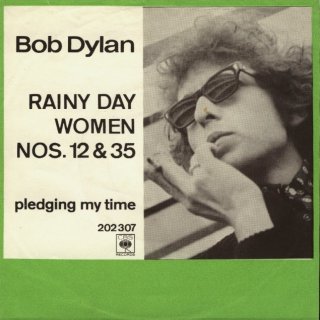
"Pledging My Time" is a blues song by American singer-songwriter Bob Dylan from his seventh studio album, Blonde on Blonde (1966). The song, written by Dylan and produced by Bob Johnston, was recorded on March 8, 1966 in Nashville, Tennessee. Dylan is featured on lead vocals, harmonica, and guitar, backed by guitarist Robbie Robertson and an ensemble of veteran Nashville session men.
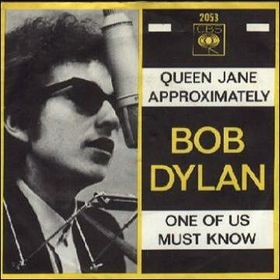
"One of Us Must Know (Sooner or Later)" is a song by American singer-songwriter Bob Dylan, which was released as a single on February 14, 1966, and as the fourth track on his seventh studio album Blonde on Blonde in June of that year. The song was written by Dylan and produced by Bob Johnston. It is the narrator's account of a burned-out relationship. It was recorded at Columbia studio A in New York on January 25, 1966, with Dylan and other musicians developing the song through over twenty takes during the session.
Barefoot Jerry is an American progressive country rock band from Nashville, Tennessee. They have been described as a seminal southern rock band. The band was most active from 1971 to 1977. It was composed of area studio musicians under the tutelage of Wayne Moss and Mac Gayden. Barefoot Jerry was named after a country fiddle player who performed inside a store next to Gayden's home in the Smoky Mountains.
James E. "Buzz" Cason was an American rock singer, songwriter, record producer, and author.
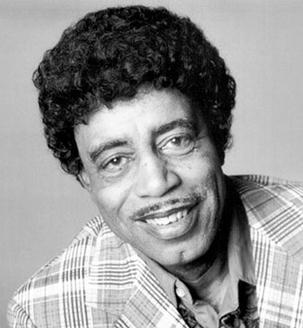
Clifford Curry Jr. was an American beach music, soul music, and R&B singer.
"Love on a Mountain Top" is a 1968 song by singer Robert Knight. The song was written by Buzz Cason and Mac Gayden, who also penned "Everlasting Love". However, it only charted regionally in the Philadelphia and Pittsburgh area. Re-discovered by the UK's Northern soul scene, it got airplay by DJs in late 1973, causing a UK re-release of the record, where the song eventually entered the UK Singles Chart and peaked at number 10 in January 1974.

"Obviously 5 Believers" is a song by American singer-songwriter Bob Dylan, which was released as the last track of side three of his double album Blonde on Blonde (1966), and was the B-side to the single release of "Just Like a Woman" for releases in America and some other countries. The song was written by Dylan and produced by Bob Johnston. It was recorded at Columbia Music Row Studios, in the early morning hours of a March 9–10, 1966 session. Four takes were recorded, although the first two were incomplete. It has been interpreted as a blues song about loneliness, with critics noting similarities in melody and structure to Memphis Minnie's "Chauffeur Blues". Dylan's vocals and the musicianship of the band on the track have both received critical acclaim, although the track has been regarded as insubstantial by some commentators.












